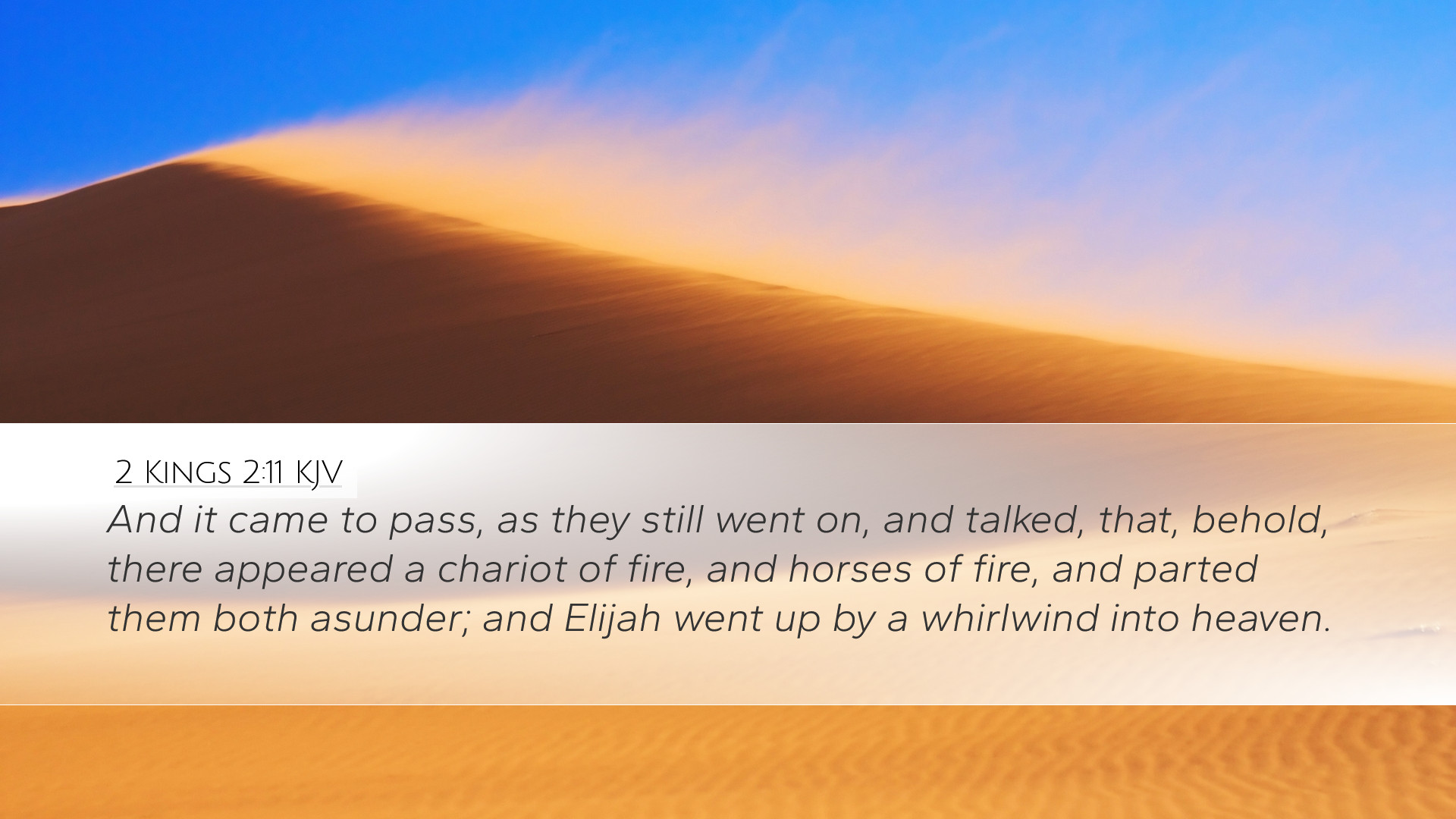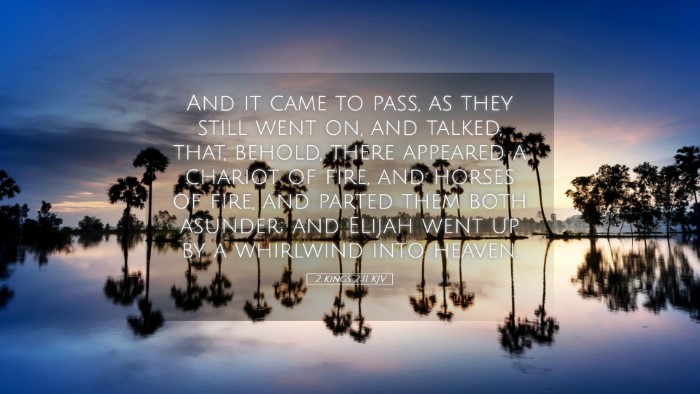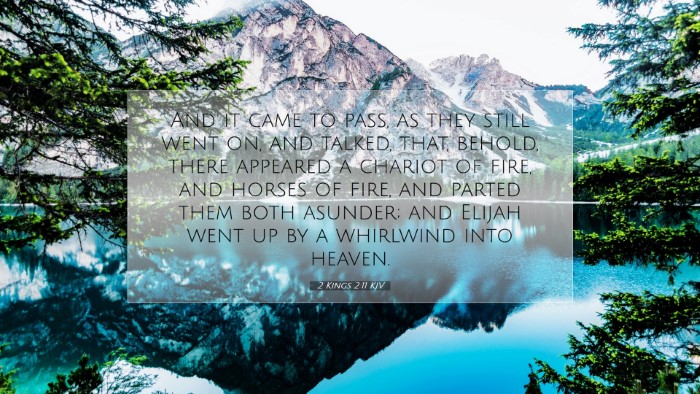Commentary on 2 Kings 2:11
Verse Text: "And it came to pass, as they still went on, and talked, that, behold, there appeared a chariot of fire, and horses of fire, and parted them both asunder; and Elijah went up by a whirlwind into heaven."
Introduction
This remarkable verse concludes the earthly ministry of one of the Bible’s most illustrious prophets, Elijah. It marks his extraordinary departure from this world and serves as a transition point that ushers in a new chapter in the prophetic history of Israel. This commentary seeks to illuminate the profound theological themes, the historical context, and the practical applications of Elijah's ascension.
Theological Significance
The account of Elijah's ascension is saturated with divine symbolism and theological implications. It emphasizes God's power over life and death and the continuity of His prophetic mission.
- Divine Sovereignty: The text showcases the sovereignty of God in orchestrating the means of Elijah's departure. The chariot and horses of fire symbolize divine intervention and majesty, illustrating that the Lord controls all creation.
- Heavenly Reality: Elijah's ascension signifies the promise of eternal life for believers, pointing toward the ultimate victory over death that awaits all faithful servants of God. It also serves as a foreshadowing of Christ's ascension, linking the two significant events and reinforcing the hope of resurrection.
- Transition of Leadership: As Elijah ascends, Elisha is left to carry on his prophetic ministry. This transfer of mantle underscores the notion of continuity in God’s work, highlighting that while individuals may come and go, God’s purpose remains steadfast.
Contextual Analysis
To fully appreciate the impact of this verse, it is crucial to consider its contextual backdrop. Elijah had been a significant figure in Israel’s history, known for his confrontation with idolatry and his unwavering commitment to Yahweh. His departure is consequential not only for Elisha but for the nation of Israel as a whole.
Throughout the preceding chapters, especially in 1 Kings, Elijah emerges as a prophet who stands against Ahab and Jezebel, delivering messages of judgment and calling the people to repentance. His experiences on Mount Carmel, his battles with the prophets of Baal, and his periods of despair showcase both his fervor and humanity.
Key Characters and Their Roles
- Elijah: As a forerunner of Christ, Elijah's ministry exemplifies zeal for God and uncompromising faith. His departure is a climax of his prophetic journey.
- Elisha: The successor of Elijah, who witnesses this awe-inspiring event, represents the new generation of prophets entrusted with the mission of calling Israel back to God.
Commentary Insights
Matthew Henry
Henry notes that Elijah’s ascension is a demonstration of God’s glory. He draws attention to the fact that Elijah’s departure was not a natural death but a miraculous ascension, illustrating that God has power over death and the physical world. Henry emphasizes the importance of preparation and faithfulness that characterized Elijah’s life, serving as a model for future generations.
Albert Barnes
Barnes highlights the majestic and terrifying imagery of the chariot and horses of fire. He asserts that this manifestation signified God’s approval of Elijah’s ministry and the significance of his role as a prophet. Barnes also connects this event to the broader narrative of God’s relationship with His people, suggesting that it serves as a reminder of the assurance of God’s presence even in moments of transition.
Adam Clarke
Clarke provides insights into the prophetic mantle that Elisha would inherit. He focuses on the implications of Elijah’s departure on the covenant community and the ongoing prophetic tradition. Clarke interprets the whirlwind as a symbol of the tumultuous nature of prophetic ministry and the challenges that lie ahead for Elisha.
Practical Applications for Ministry
- Recognizing Divine Calling: Like Elijah, ministers today are called to be faithful to their mission, regardless of the opposition they face. This passage encourages past and present leaders to remain steadfast in proclaiming God’s truth.
- Importance of Mentorship: The relationship between Elijah and Elisha underscores the significance of mentorship within ministry, emphasizing that preparation for future leadership is essential for the continuity of God’s work.
- Living with Eternal Perspective: Elijah’s ascension serves as a powerful reminder for believers to live with an awareness of eternity, prompting a life that seeks to fulfill God’s purposes on Earth with the hope of eternal reward.
Conclusion
2 Kings 2:11 encapsulates the divine orchestration of Elijah’s departure in a manner that is rich in theological significance and practical implications. Through the lens of various commentators, we gain deeper insights into God’s sovereignty, the continuity of prophetic ministry, and the hope of eternal life. As students of Scripture and pastors, we are invited to reflect on the legacy of faith exemplified in this passage and to be inspired to carry forward the mission of God in our own contexts.


